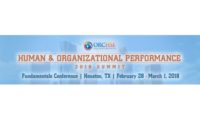Mistakes will happen. It’s human error. People are people working within the context of systems, so GE takes people out of the equation and focuses on risk, the risks of the systems that employees work within, said Ann R. Klee, the VP for Environment, Health and Safety at GE, speaking at the opening session of the 30th annual meeting (Aug. 25-28) of the Voluntary Protection Program Participants’ Association (VPPPA), in National Harbor, MD, outside of Washington DC.
Error is part of the human condition
GE recently has embraced and implemented human and organizational performance (HOP), said Klee. HOP is an operating philosophy focused on protecting people, products and property from human error. It starts by recognizing that human error is part of the human condition. Performance improvement is pursued through identifying hidden weaknesses and traps associated with the operating systems that GE workers must navigate to do their jobs.
The GE corporate EHS team oversees and supports HOP goals with training, tools and cross-business forums. The team also oversees long-term plans for HOP integration developed by individual GE businesses using risk-based prioritization. Participation by operational leaders and employees has been critical to achieving early successes and discovering new synergies with disciplines outside of EHS such as quality and LEAN manufacturing, said Klee.
The anti behavior-based safety approach
One EHS consultant calls HOP the anti behavior-based safety approach. The emphasis is not on observing and correcting (or praising) individual behaviors but operational systems.
HOP also calls into question the goal of many safety professionals of achieving and sustaining zero injuries. The HOP philosophy accept human error as inevitable, and works around human foibles by reducing weaknesses and traps – risks -- in work processes through stringent auditing and risk assessment and mitigation based on the severity and probability of risk.



